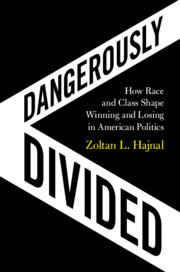Book contents
- Dangerously Divided
- Dangerously Divided
- Copyright page
- Dedication
- Contents
- Illustrations
- Tables
- Acknowledgments
- Introduction
- Part I Fault Lines
- Part II The Consequences – Racial Inequality in Representation
- 2 Who Wins Office?
- 3 Which Voters Win Elections?
- 4 Who Wins on Policy?
- Part III Immigration’s Rising Impact on American Democracy
- Part IV Seeking Greater Equality
- Notes
- Appendix
- References
- Index
2 - Who Wins Office?
from Part II - The Consequences – Racial Inequality in Representation
Published online by Cambridge University Press: 03 January 2020
- Dangerously Divided
- Dangerously Divided
- Copyright page
- Dedication
- Contents
- Illustrations
- Tables
- Acknowledgments
- Introduction
- Part I Fault Lines
- Part II The Consequences – Racial Inequality in Representation
- 2 Who Wins Office?
- 3 Which Voters Win Elections?
- 4 Who Wins on Policy?
- Part III Immigration’s Rising Impact on American Democracy
- Part IV Seeking Greater Equality
- Notes
- Appendix
- References
- Index
Summary
Racial divisions in the vote raise concerns. In American democracy most White Americans end up on one side of the vote, while the overwhelming majority of racial and ethnic minorities end up on the other. This racial divide is growing, now rivaling or surpassing all other demographic divisions in the vote. Division may be a normal and healthy part of democracy, but when the main political divide in a society so closely mirrors the racial identities of its public, larger issues emerge.
The potentially negative consequences of this large and growing racial divide are not hard to imagine. Indeed, the math is quite simple. Although America is becoming more and more racially diverse, it is still a nation dominated by Whites. Whites still represent 61 percent of the population. And more critically, they still account for over 70 percent of the active voters in the country. Given that most Whites oppose candidates favored by most racial and ethnic minorities, the odds that minorities will lose out in American democracy are high. The White majority could effectively shut out racial and ethnic minorities from most aspects of the democratic process.
- Type
- Chapter
- Information
- Dangerously DividedHow Race and Class Shape Winning and Losing in American Politics, pp. 83 - 98Publisher: Cambridge University PressPrint publication year: 2020

